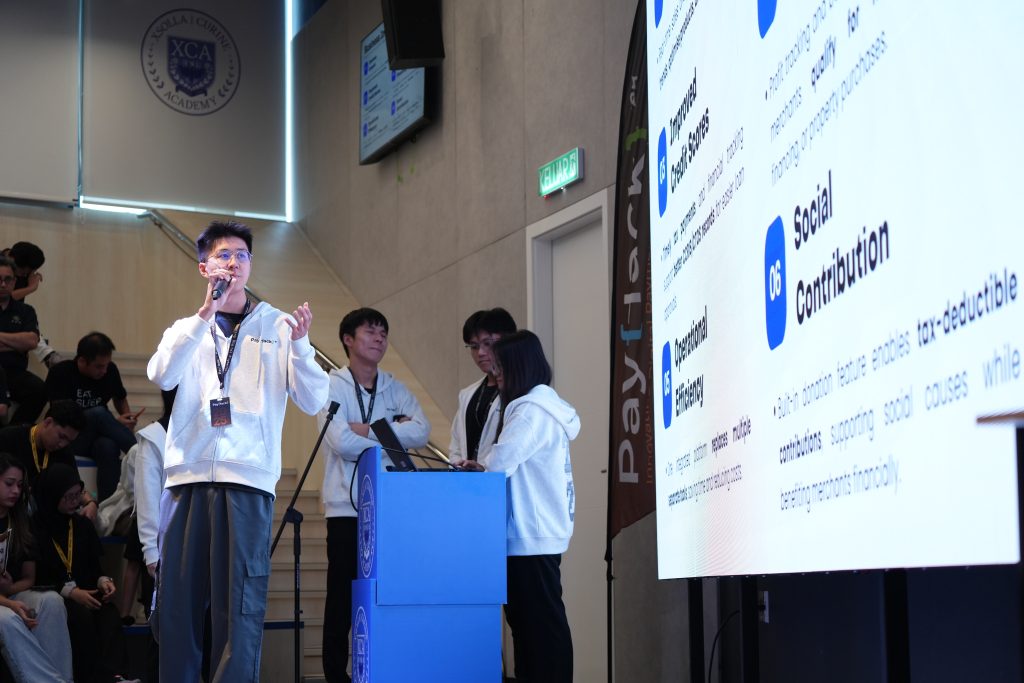Payments Network Malaysia Sdn Bhd (PayNet), through its environmental, social, and governance (ESG) initiative PayNet Akar, has successfully held Malaysia’s largest intervarsity hackathon, PayHack 2025. Organised in collaboration with Ant International and supported by Asia Pacific University of Technology and Innovation (APU), the event brought together more than 400 students from 21 public and private universities across the country to address gaps and risks in digital payments.
Seventeen teams advanced to the grand finals, which took place on 2 and 3 August at Xsolla Curine Academy in KL Eco City. Over an intense 48-hour sprint, the finalists worked tirelessly to transform their proposals into working prototypes that tackled some of the most pressing challenges in the financial services industry. The hackathon encouraged students to think boldly and creatively in areas such as digital payments innovation, cybersecurity, MSME enablement, and ESG integration, with a strong emphasis on developing solutions that can address tomorrow’s problems today.
“PayHack is more than a competition. It’s a platform for young innovators to reimagine what’s possible and to lead with purpose, collaboration, and creativity. Through PayHack, we’re nurturing the next generation of changemakers who will shape the future of payments with innovation, integrity, and impact,” said Shafenaz Farouk, PayNet’s Chief People Officer.
The winning team, RoadTo20K from Universiti Malaya, impressed the judges with BizKuKu, an all-in-one digital platform designed to help Malaysian MSMEs with low digital literacy seamlessly register, manage, and scale their businesses. BizKuKu offers end-to-end support for sustainable growth, from company registration with Suruhanjaya Syarikat Malaysia (SSM) and integration with banking and digital payments to marketplace onboarding, financial insights, and AI-powered funding recommendations.
Close behind was Roti CanAI from APU in second place, followed by Pineapple Donkey from Heriot-Watt University Malaysia in third. Fourth place went to Da House from APU, while TapirPay from Universiti Sains Malaysia (USM) secured fifth. Special recognition was also given to X-Chain from Universiti Malaysia Sarawak (UNIMAS), which received the Hustler Award, and PEPE from USM, which won the Pitch Perfect Award.

The hackathon offered a total prize pool of RM55,000, with the champions taking home RM20,000. The first and second runners-up received RM12,000 and RM6,000 respectively, while fourth and fifth place earned RM3,000 and RM2,000. All other finalists were awarded RM1,000 each in recognition of their effort and innovation.
Student innovations showcased throughout the competition were diverse and impactful. Solutions ranged from fraud and cyber threat detection to sustainability-driven payment platforms, including offline payment solutions, fraud prevention features integrated into eKYC systems for banks and e-wallets, and platforms offering e-invoicing, micro-loans, and tokenised onboarding for MSMEs.
PayHack 2025 kicked off in June with more than 90 teams submitting proposals. After a month of preliminary rounds, 33 teams advanced to the semifinals in July, where they were tasked with developing minimum viable products and presenting them virtually under the theme “Payment without Borders.” From that point, participants received mentorship from experts at PayNet, Ant International, Bank Islam Malaysia, and FWD Insurance. The finals were judged by an esteemed panel of leaders from the financial services and technology ecosystem, including Teh Lip Guan of PayNet, Evan Gao of Ant International Malaysia, Alan Ong of MBAN, Anil Singh Gill of FAOM, and Kok Chiann (KC) of Setel Ventures.
PayHack 2025 stands as a reflection of PayNet Akar and Ant International’s commitment to future-proofing Malaysia’s financial services industry by cultivating innovation-ready, values-driven young talent. Carrying the tagline “Innovating Digital Payments, QRiously,” the hackathon served not just as a competition but as a launchpad for Malaysia’s next generation of changemakers who will shape the future of digital payments.
